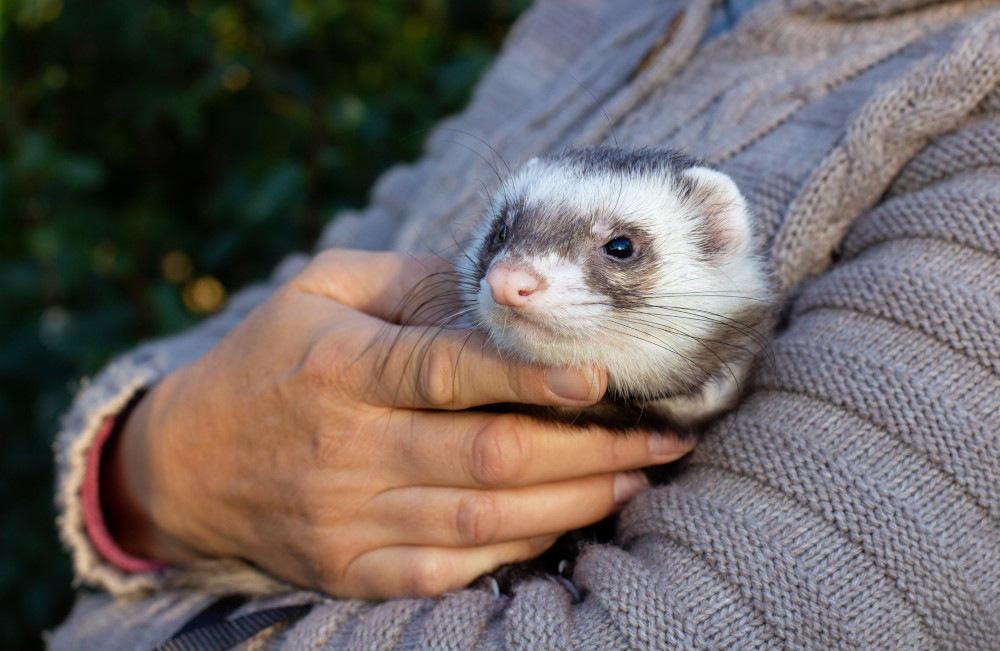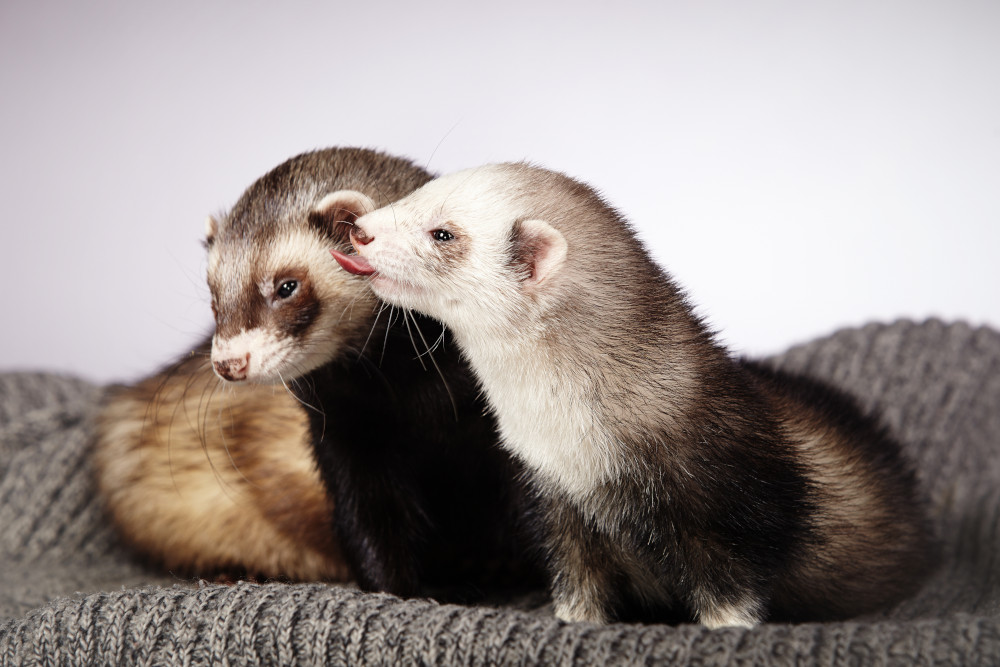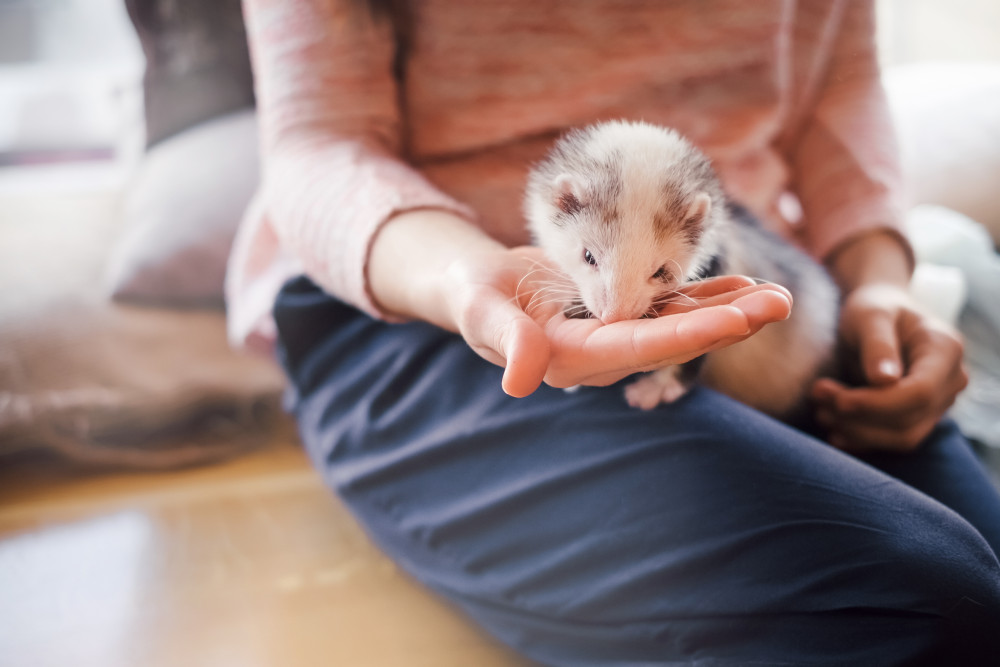
Normal social behaviour
Domesticated ferrets, unlike their wild cousins (the polecat and the weasel), are diurnal animals (active during the day), and many can be kept in pairs or groups without conflict. Their domestication has also meant that they have evolved from their more solitary ancestors to be more social animals, preferring the company of other ferrets and people.
Most ferrets enter the pet trade at any time from 6 to 10 weeks of age. It seems safe to assume that ferrets, like dogs and cats, have a critical period of socialisation, where they learn to socialise with both other ferrets and people. For ferrets, this period occurs between the time their eyes open at 4 weeks of age to 10 weeks.
It is thought that ferrets do not form any kind of social hierarchy (i.e., a pecking order), and that positioning for dominance does not occur. Nevertheless, ferrets will fight occasionally, especially when exposed to an unfamiliar ferret. When two ferrets first meet, they will use their sense of smell in a ‘meet-and-greet’ behaviour, sniffing each other’s anal area, neck, and shoulders. This may give a ferret information about the other ferret’s sex and hormonal status.
Ferrets mark their territory by backing up and defecating on objects or certain areas (and some even ‘scoot’ after defecation) to mark their territory. This behaviour increases in some animals when a new ferret is introduced to the household.
Socialising with other ferrets

Ideally, ferrets should be kept in small groups (2-4), keeping littermates is preferable (so they have learned their social skills together). It is often suggested to keep at least three ferrets so that, in the event of the unexpected loss of one ferret, the remaining ferrets have each other as company.
It is important to discuss and implement a plan for reproductive control in your group of ferrets with your veterinarian before your ferrets reach sexual maturity or before introducing a new mature ferret.
Your ferrets should have plenty of space and sleeping places, easy access to several food and water dishes, and shelter that they can access individually or with their ferret companions depending on how they feel at the time – this reduces or eliminates the need for competition.
When introducing a new ferret, do it over a few weeks. Swap bedding from one ferret to the other (so the scents of each ferret become familiar). Allow the new ferret to have free run of the room while the more established ferret remains in their enclosure. When you do introduce them, do so in a neutral territory (avoid being anywhere near an enclosure or room that one of the ferrets considers their own) and watch for signs that they are not getting along.
Signs of aggression or incompatibility include clamping down and biting the other ferret’s neck or running away and cowering in fear. Ferrets love to chase each other though, so watch to see if the one being chased turns around to play eventually, or if one ferret only runs and hides. The former can be normal play, the latter (e.g., one ferret always running and hiding) may be a sign of aggression or incompatibility and should prompt intervention and caution.
Check your ferrets carefully each day for any sign of stress, fear, or aggression. Once they know each other, your ferrets should be alert, active, easy to handle, curious, and playful with each other. Repeated hiding, biting, or fighting suggests aggression in the group (these are reasons to make changes to the group or to the housing). You could add hiding places or move one or two ferrets to other suitable accommodation. If you see your ferrets fighting, check them over for blood on their fur, especially around the neck (indicating a bite). See your veterinarian’s advice, he ferrets may need veterinary care to manage bites, manage associated pain, and prevent complications and infection.
Note that if a ferret is removed from their companion ferrets for a couple of days or more (e.g., if the ferret must be hospitalised at the veterinarian) can result in that ferret being perceived by the others as a stranger on their return, which can lead to fighting. So, monitor their interactions after any separations and you may need to carefully reintroduce them. The ferrets left behind when one of their group is removed may also show stress related behavioural changes while their companion is away.
Socialising with people
Handling your ferrets every day from an early age, and in a fun and positive way (did anyone say treats?) is a great way to develop a solid bond between you and them. This will be incredibly rewarding to you all. Note that, if you only have one ferret, they will need your companionship through extensive daily interactions. Remember that any children handling ferrets must be closely supervised to prevent injuries or stress to both the children and ferrets.
The use of rewards (e.g., a favourite snack) can greatly assist socialisation, as your ferrets will look forward to seeing you, and will want to interact!

Older ferrets readily show affection for their human owners through gleeful greeting behaviour and willingness to shower their owners with ferret kisses. Young ferrets, on the other hand, are not likely to enjoy quiet cuddle time. Their exploratory behaviour creates too strong an urge to get off an owner’s lap and move on to investigate the environment around them. As ferrets mature, a combination of age, improved socialisation, and a decrease in exploratory behaviour results in a settled calm ferret who enjoys periods of quiet snuggling and petting.
References
Fisher P (2016) Ferret behaviour. In: Veterian Key. Accessed 7 Jul 2023
Meredith A (2016) Ferret behaviour, housing and husbandry. In: Johnson-Delaney C (ed) Ferret Medicine and Surgery. CRC Press, pp 31–46
RSPCA UK (2023) Ferrets. Accessed 7 Jul 2023
